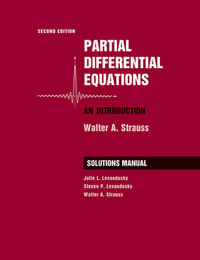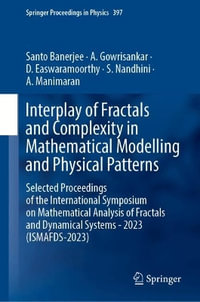These are exciting times for mathematics, science, and technology. One of the fields that has been receiving great attention is Chaos Theory. Actually, this is not a single discipline, but a potpourri of nonlinear dynamics, nonequilibrium thermodynamics, information theory, and fractal geometry. In the less than two decades that Chaos Theory has become a major part of mathematics and physics, it has become evident that the old paradigm of determinism is insufficient if we are to understand - and perhaps solve - real life problems. Curiously, many of these problems are deterministic, but they are intertwined with randomness and chance. Thus the deterministic laws of physics coexist with the laws of probability. Consequently, uncertainty arises and unpredictability occurs, characteristic of complex systems.
In its short lifetime Chaos Theory has already helped us gain insights into problems that in the past we found intractable. Examples of such problems include weather, turbulence, cardiological and neurophysiological episodes, economic restructuring, financial transactions, policy analysis, and decision making. Admittedly, we can as yet solve only relatively simple problems, but much progress has been made and we are now able to observe complex problems from new vantage points that provide us with numerous benefits. One such benefit is the universality of Chaos Theory in its applicability to different situations, which enables us to look at communal problems in an interdisciplinary manner, so that persons of different backgrounds can communicate with one another. Chaos Theory also enables us to reason in a holistic manner, rather than being constrained by simplistic reductionism. Finally, it is gratifying that the mathematics is not intimidating, and one can accomplish much with a personal computer or even a handheld calculator.
Industry Reviews
"This short, somewhat conversational book is illuminating on a variety of topics, such as attractors, nonlinear population equations, logistic maps, fractal dimensions, and Mandelbrot sets. It is written in an engaging manner at a level suitable for undergraduates, and the references are well chosen and fairly up to date....Cambels book will be a rewarding experience."
--NATURE
"[This] work fills an important niche between books on the application of mathematical techniques and books on hardware....It should be viewed by most undergraduate institutions as an important reference."
--CHOICE (added 9/20/93 LMW)
"Chaos theory, at the heart of the new sciences of complexity, is surveyed in this readable and entertaining survey for the nonspecialist. Will be of interest to public and school libraries, and as a supplemental text in introductory college level courses. Includes a list of discussions."
--NEW TECHNICAL BOOKS [12/92]
"The topic of your book is complex and prickly; I admire you for undertaking its explanation."
--LAURIE HODGES, Ph.D., Atlanta, Georgia
"Your scholarly point of view, the meticulous method of approach, authoritative exposition of the subject matter and, concomitantly, its straightforward treatment, provide your book with a potential to become an object of high demand. It will certainly be high on my list of recommended texts."
--PROFESSOR A.K. OPPENHEIM, Berkeley, California
"Of all the many current books on Chaos Theory, this one explains the underlying why and how of chaos. From money to medicine, it covers chaos theory applied to living and science. The scientific layman, beginning student, and advanced theorist will all profit from the clear explanations. If your knowledge of Chaos Theory is chaotic, this is the book to read."
--FRANK W. SUMMERS, M.D., Santa Ana, California
























